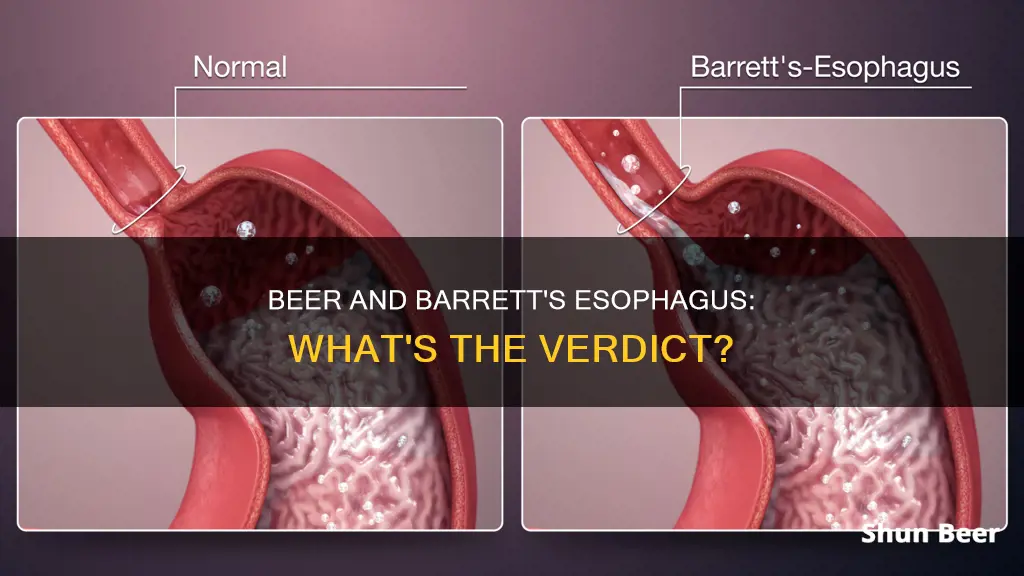
Alcohol consumption is a well-known risk factor for several types of cancer. However, its role in the development of Barrett's oesophagus and subsequent progression to esophageal cancer is less clear. While some studies have found a positive association between alcohol intake and Barrett's oesophagus, others have reported no link or even a protective effect, particularly for wine consumption. This has led to conflicting advice for patients with Barrett's oesophagus regarding alcohol consumption, specifically beer drinking. This paragraph aims to introduce and discuss the current evidence on the relationship between alcohol, Barrett's oesophagus, and associated cancer risk to provide clarity on this important topic.
| Characteristics | Values |
|---|---|
| Alcohol consumption and the risk of Barrett's Esophagus | No significant association found between alcohol consumption and the risk of Barrett's Esophagus. However, wine consumption was associated with a moderately reduced risk. |
| Alcohol consumption and the risk of developing Barrett's Esophagus | No association found between alcohol consumption and the development of Barrett's Esophagus. |
What You'll Learn

Wine consumption and Barrett's oesophagus
Wine consumption has been linked to a reduced risk of developing Barrett's oesophagus, a condition that affects around 2% of the Western population and is considered a precursor to oesophageal cancer. This link has been observed in several studies, although the underlying reasons for this association are still not fully understood.
One theory suggests that the antioxidants in wine, such as polyphenols, may play a protective role by neutralising the oxidative damage caused by gastroesophageal reflux disease (GERD). GERD is a common risk factor for both Barrett's oesophagus and oesophageal cancer. Wine drinkers may also benefit from the anticancer effects of resveratrol, found in red grape skin. Additionally, wine drinkers typically consume food with their drink, which could reduce the damaging effects of alcohol on the oesophageal tissue.
However, it is important to note that the protective effect of wine consumption is greatest with moderate intake, such as one or two glasses per day. Higher consumption does not further increase this benefit. Furthermore, while wine may reduce the risk of Barrett's oesophagus, it is not a guarantee of prevention, and maintaining a healthy weight and managing GERD symptoms are still crucial factors in lowering the risk.
In summary, while wine consumption has been associated with a reduced risk of Barrett's oesophagus, it should not be relied upon as the sole preventive measure. A combination of lifestyle changes, including moderate wine intake, a balanced diet, and weight management, may collectively contribute to a lower risk of developing this condition.
Drinking Beer in Ads: Is It Legal?
You may want to see also

Alcohol consumption and neoplastic progression
Alcohol consumption is a well-known risk factor for several types of cancers. Its effect on the progression of Barrett's oesophagus into esophageal adenocarcinoma (EAC) has been studied extensively.
Barrett's oesophagus is a condition in which the tissue that lines the oesophagus becomes precancerous. It is believed to be associated with gastroesophageal reflux disease (GERD). While the exact causes of Barrett's oesophagus are not fully understood, certain lifestyle and dietary risk factors have been proposed, including body mass index (BMI), alcohol intake, smoking, job type, education, and drug use.
Several studies have investigated the association between alcohol consumption and the risk of Barrett's oesophagus, but the results have been inconsistent. Some studies reported a positive association between higher alcohol consumption and Barrett's oesophagus, while others found no significant association. A 2015 meta-analysis of 20 eligible cohort studies involving 42,925 participants concluded that overall alcohol consumption was not associated with an increased incidence of Barrett's oesophagus. However, subgroup analyses showed that Asian drinkers had a relatively higher risk compared to Western drinkers, and women who consumed more alcohol were less likely to develop Barrett's oesophagus.
Regarding the neoplastic progression from Barrett's oesophagus to EAC, a 2014 systematic review and meta-analysis of 14 observational studies found that alcohol consumption was not associated with an increased risk. This result was consistent across different study designs, geographic locations, and endpoints. However, studies conducted in the Americas showed that alcohol drinking increased the neoplastic risk. The geographical differences, dietary diversity, and ethnic and genetic variations are possible reasons for these discrepancies.
While alcohol consumption does not appear to be a significant risk factor for neoplastic progression in Barrett's oesophagus, it is important to note that other factors, such as smoking, high BMI, and certain dietary habits, have been associated with an increased risk. Therefore, maintaining a healthy lifestyle and diet is crucial for individuals with Barrett's oesophagus to reduce their risk of progression to EAC.
Drinking Beer at Work: Is It Ever Okay?
You may want to see also

Risk factors for Barrett's oesophagus
Several risk factors have been identified for Barrett's oesophagus, a premalignant condition associated with the development of oesophageal adenocarcinoma. These risk factors include:
- Male gender
- Advanced age
- Family history of the disease
- Long-standing gastro-oesophageal reflux disease (GORD)
- Smoking
- Obesity, particularly abdominal or central obesity
- Caucasian race
- Diabetes
While alcohol consumption is not a direct risk factor for Barrett's oesophagus, it may increase the risk of GORD, a primary risk factor. Therefore, reducing alcohol intake, particularly beer and other carbonated beverages, can help manage GORD symptoms and reduce the risk of Barrett's oesophagus.
Do Sulfite Wands Really Work for Beer?
You may want to see also

Lifestyle changes for Barrett's oesophagus
Barrett's oesophagus is a condition in which the tissue that lines the oesophagus becomes precancerous. While the condition is not reversible, there are effective ways to manage gastroesophageal reflux disease (GERD), which is a condition believed to be associated with Barrett's oesophagus. Lifestyle changes can help reduce the risk of Barrett's oesophagus progressing to cancer.
Diet
Avoiding trigger foods such as chocolate, coffee, fried foods, peppermint, spicy foods, and carbonated beverages can help reduce GERD symptoms by reducing acid levels in the stomach. Doctors recommend eating multiple small, frequent meals instead of a few large ones. To prevent reflux from occurring while sleeping, it is advised to wait at least three to four hours after eating before lying down and to elevate your head at bedtime.
Research suggests that drinking alcohol may increase the risk of GERD and Barrett's oesophagus. Doctors recommend avoiding alcohol altogether if you have been diagnosed with either condition.
Smoking
People with Barrett's oesophagus who smoke have a higher risk of developing oesophageal cancer than those who don't. Smoking increases stomach acid production and weakens the muscular valve that separates the oesophagus from the stomach. It can also decrease saliva production, which helps neutralise acid.
Weight Management
Carrying excess weight, especially around the belly, can compress the stomach and cause acid to rise into the oesophagus, worsening GERD symptoms. Doctors can refer patients to specialists and nutritionists to help with weight loss and discuss whether bariatric surgery may be an option.
Lovastatin and Beer: A Safe Mix?
You may want to see also

Alcohol consumption and risk of Barrett's oesophagus
Alcohol consumption and Barrett's oesophagus risk have been widely studied, with several studies investigating the association between the two. However, the results have been inconsistent, with some studies reporting a positive association and others finding no link. This inconsistency could be due to differences in study design, exposure categorisation, and insufficient power to detect associations. To address this, a comprehensive meta-analysis was conducted, including data from twenty cohort studies with 42,925 participants. The analysis found no significant association between overall alcohol consumption and the risk of developing Barrett's oesophagus. However, when stratified by geographic region, a positive association was found among Asian drinkers, with a relative risk of 1.34 compared to Western drinkers. Interestingly, an inverse association was observed among women, with lower alcohol consumption being linked to a reduced risk of Barrett's oesophagus.
The relationship between alcohol consumption and Barrett's oesophagus is complex and may be influenced by various factors. One possible explanation for the higher risk among Asians could be the difference in alcohol sensitivity among ethnic groups. The polymorphism of the ALDH2 gene, which is more prevalent in Asians, results in higher levels of acetaldehyde, a known carcinogen. In contrast, the inverse association in women may be related to the interaction between alcohol and hormone-related diseases, particularly cancers. Alcohol can disrupt estrogen metabolism and increase estrogen levels, which may have a protective effect against Barrett's oesophagus.
While the meta-analysis provides valuable insights, it is important to consider its limitations. The methods for measuring alcohol consumption varied across studies, and only total alcohol consumption was analysed, not specific beverage types. Additionally, the definition of former drinkers may have included only a fraction of actual former drinkers, potentially impacting the results. Further large-scale prospective studies are needed to confirm these findings and better understand the underlying mechanisms.
Drinking Beer in Public: Italian Laws and Culture
You may want to see also
Frequently asked questions
While there is no definitive answer to this question, it is generally recommended that individuals with Barrett's esophagus avoid alcohol altogether. Research suggests that drinking alcohol may increase the risk of gastroesophageal reflux disease (GERD) and Barrett's esophagus.
Wine seems to protect against the development of Barrett's esophagus. However, it is important to note that excessive alcohol consumption, regardless of type, can have negative effects on your health. Always drink in moderation and consult a doctor if you have any concerns.
Alcohol consumption is not a direct risk factor for the development of Barrett's esophagus or its progression to esophageal adenocarcinoma. However, heavy alcohol consumption can increase the risk of other health issues and may worsen GERD symptoms, which are often associated with Barrett's esophagus.







